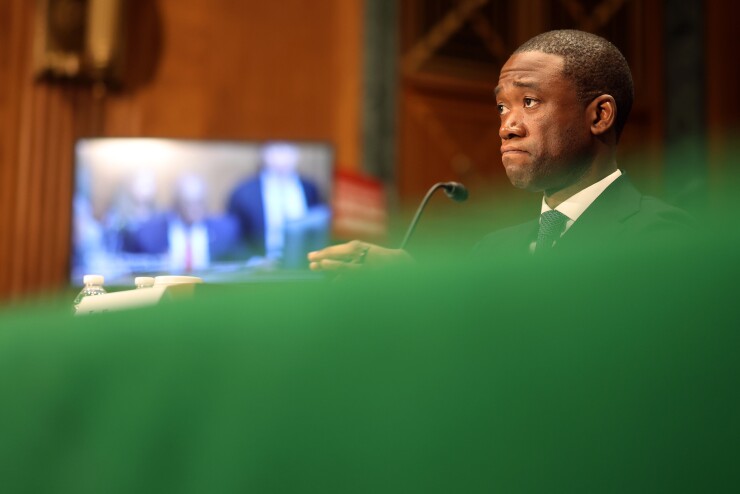
Top executives of the Federal Home Loan banks have
The chairs of the boards of the 11 Federal Home Loan banks
"We believe that simply raising the AHP and voluntary contributions to 20% of our pre-assessment net income will not address the underlying complexities of the housing crisis," the bank chairs said in the letter. "This increased funding level, which requires annual approval by each FHLBank's board of directors, is 50% more than what is required by statute. Consideration of a higher set aside should be undertaken by Congress."
The response is the latest skirmish
The chairs of the Home Loan banks said they oppose any efforts to divert profits from its members, claiming that doing so would weaken the system's capital position. Last year, the Home Loan banks agreed to each voluntarily contribute 15% of their net income to the system's affordable housing program. That contribution is expected to reach $1 billion this year, making it one of the largest funders of affordable housing in the country.
The letters will provide more fodder for critics that claim the little-known system, created in 1932 to support mortgage lending after the Great Depression, receives billions in subsidies and generates outsize profits for its members while providing far less support for its mission of affordable housing.
The
In early August, Adeyemo and Federal Housing Finance Agency Director Sandra Thompson met with the 11 Home Loan bank presidents and requested that the system deploy significantly more resources to expand the housing supply, according to a
In the three-page letter, the chairs refused to do so.
"We are opposed to any approach that could weaken our capital position, as this would ultimately diminish our ability to fulfill our statutory mandate of providing liquidity to the financial system and supporting housing finance and community development," the letter stated.
Though the Federal Home Loan banks are government-sponsored enterprises, they were structured by statute as private cooperatives, funded with private capital from 6,500 financial institutions including banks, credit unions and insurance companies.
Critics have nonetheless claimed that members of the Home Loan banks receive billions in low-cost funding and that the system provides too little in return for the massive government subsidy. Last year, the Congressional Budget Office estimated that the
The Home Loan banks are exempt from federal, state and local taxes, and from registration requirements with the Securities and Exchange Commission, which reduces the system's operating costs.
The presidents of the Home Loan banks said the structure "must be preserved" to ensure the continued stability and reliability of the system.
"Our retained earnings and capital reserves are not only the foundation for our safe and sound operations; they also insulate U.S. taxpayers from risk," the chairs said in the letter. "But most importantly, they serve as the bedrock for supporting our member financial institutions, whose activity with the FHLBanks is the primary engine for the FHLBanks' affordable housing and community development mission."
In a second letter sent to Adeyemo, the Home Loan banks' presidents wrote that FHFA should instead work to remove "existing barriers" that they said hinder the banks' abilities to implement and grow affordable housing strategies, including broadening access to Community Development Financial Institutions and reducing the administrative and regulatory burden of the housing program.
"The liquidity provided by each of the FHLBanks to its members stands as the cornerstone supporting the largest source of private capital for affordable housing and community development initiatives in the country," the presidents said. "It is important to preserve the value proposition of the FHLBanks and we seek to avoid changes to the FHLBank System that would reduce net income and result in less funding for affordable housing and community development activities."
The FHFA, the system's regulator, was already conducting a





